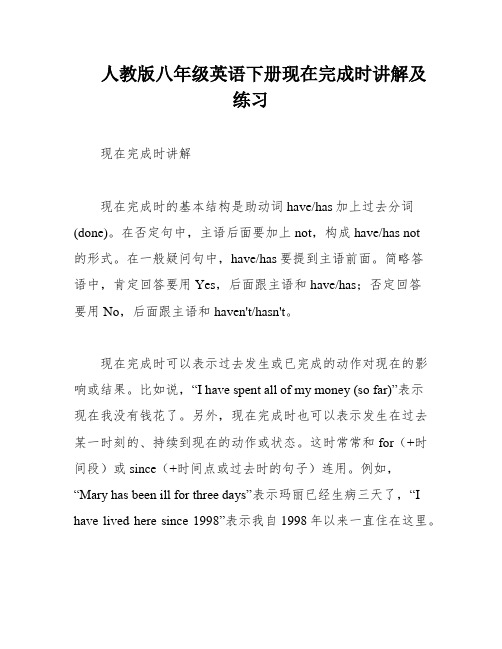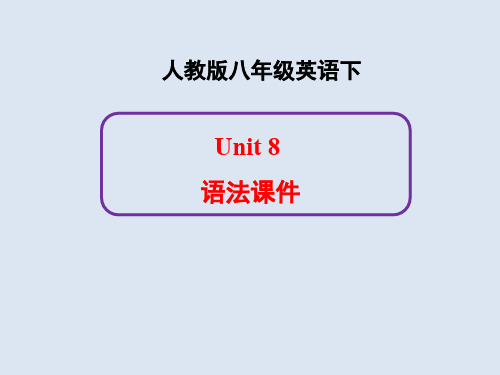英语人教版八年级下册现在完成时
人教版八年级英语下册现在完成时讲解及练习

人教版八年级英语下册现在完成时讲解及练习现在完成时讲解现在完成时的基本结构是助动词have/has加上过去分词(done)。
在否定句中,主语后面要加上not,构成have/has not的形式。
在一般疑问句中,have/has要提到主语前面。
简略答语中,肯定回答要用Yes,后面跟主语和have/has;否定回答要用No,后面跟主语和haven't/hasn't。
现在完成时可以表示过去发生或已完成的动作对现在的影响或结果。
比如说,“I have spent all of my money (so far)”表示现在我没有钱花了。
另外,现在完成时也可以表示发生在过去某一时刻的、持续到现在的动作或状态。
这时常常和for(+时间段)或since(+时间点或过去时的句子)连用。
例如,“Mary has been ill for three days”表示玛丽已经生病三天了,“I have lived here since 1998”表示我自1998年以来一直住在这里。
现在完成时还有一些标志词,可以表达过去完成的动作对现在的影响。
这些标志词包括already、just和yet。
例如,“He has al ready got her help”表示他已经得到她的帮助,“He hasn't come back yet”表示他还没有回来。
This is the best film I have ever seen。
I have never seen a better movie before.He has never been to Beijing before。
He has never had the chance to visit Beijing.He says he has been to the USA three times already。
He has had the opportunity to visit the USA on three separate ns.So far。
人教版英语八年级下册现在完成时(易懂版本)

现在完成时一、两个含义:①表示动作发生在过去,但对现在的情况造成了影响。
(借古讽今)He opened the door.The door is open.I saw the movie.I have seen the movie.I got married.I have got married.②表示从过去某一时间开始一直延续到现在并还可能继续延续下去的动作,用于延续性动词,且句中常带有表示一段时间的时间状语,如:since + 时间点/从句,for two months, so far等。
(从古至今)I have learned English for 10 years/since 10 years ago.I have lived in Chengdu for 12 years/since 12 years ago.I have been a teacher for 2 years/ since 2 years ago.二、构成have/has+动词的过去分词(done)三、标志词for, since, already, yet, before, recently, over the …., in the past few…..四、already与yet的区别already用于肯定句(已经)yet用于否定句(还)和疑问句(已经)ever & neverever作副词,意为“曾经”,常用于现在完成时的一般疑问句和肯定句中,置于主语之后,过去分词之前。
never作副词,意为“从不;从未”,用于现在完成时中,表示否定,位于助动词have/has之后,过去分词之前。
五.have been to & have gone to & have been inhave been to 去了某地,已回have gone to 去了某地,未回have been in 在哪里待了多久后面是地点副词there、here、home 时,省略to六、延续性和非延续性1. 含义:延续性动词表示能够延续的动作,这种动作可以延续下去或产生持久影响。
Unit8现在完成时课件人教版八年级英语下册

1.找
2. 变
3.去
4.加
What have they haddaomeal at a restaurant since they left school?
特殊疑问句
特殊疑问句= 特殊疑问词+ 一般疑问句
what who when which why what color what time
代替事物、事情 代替人 代替时间 代替事物,表选择 代替原因 代替颜色 代替时间点
2、before 表示之前发生的事情,放在句末。 I have been。
现在完成时的时间状语:
3、yet 放在否定句和一般疑问句句末。
just, before, recently,still, lately, never, ever, twice, on several occasions, in the past/weeks/months/years, till now.
6、ever
表示经常的或习惯性的动作,常与表示频率的时间状语连用。 放在 have/has后面,动词后面
例句:Their debts have grown ever larger. 他们的债务不断增加。
根据句意,完成下列句子 1,They _h_a_v_e_g_o_n_e (go) to the Beihu Park this year.
2,以不发音的e结尾
+d
3, 辅音字母+y结尾
改y为i+ed
4,以重读闭音节结尾, 双写该辅音字母
末尾只有一个辅音字母
+ed
示例
work---worked visit---visited
live---lived hope---hoped
Unit 9 现在完成时-八年级英语下册(人教版)

2.Me, too. = So have I. Me, neither.= Neither have I.
现在完成时
现在完成时可表示过去发生或已经完成的动作对现在造 成的影响或结果。 e.g. I have lost my pen. (我现在无钢笔可用)
—Sorry, he isn’t in. He __h_a_s_g_o_n_e__to___ the school library. 2) —Are you looking forward to going to Paris?
—No. I __h_a_v_e__b_e_e_n_t_o__ the city twice. 3) —Are you interested in going to the Palace Museum?
He __h_a_s_n_'t_ __ea_t_e_n__ all the food on the plate ___y_et___. 3) —Has Peter driven a car before? (作肯定回答)
—__Y__es___, ___h_e___ ___h_a_s__. 4) —Mary, have you got a job yet? (作否定回答)
考点三:一些短暂性动词转换成意义相近的延续性动词或 be+形容词 / 副词 / 介词短语 / a(n)+名词,与表示 一段时间的状语连用。如:buy → have borrow → keep move → live die → be dead open → be open close → be closed fall asleep → be asleep marry → be married leave → be away come → be in / at begin / start (电影等开始) → be on join → be in +组织 / be a member in +组织
现在完成时(unit8--unit10知识点总结)人教版英语八年级下册

现在完成时一.定义三要素与构成〔has/have done〕1.表示到现在为止已经完成或刚刚完成的动作。
By now, I have remembered 1000 English words.2.一件发生在过去的事情对现在产生影响。
常见时间状语:常和already〔已经〕,yet〔已经〕,just〔刚刚〕,still〔仍旧〕,so far〔到目前为止〕,till now,(直到现在),before〔以前〕,ever〔曾经〕,3 times(三次),in the past/last..years(在过去几年)I have spent all of my money so far.(1)already:〔已经〕用于确定句位置:放于助动词与done 之间或者放在句末(2)yet:疑问句〔已经〕否认句〔还〕位置:常放句尾(3)ever(曾经):疑问/确定位置:助动词与done之间(4)never〔从不〕位置:助动词与done之间【练习】〔1〕——你吃过早餐了吗?—Have you had breakfast ____?——是的,我已经吃过了。
/不,我还没吃。
—Yes,I have ________ had it./No,I haven’t had it ____.〔2〕I have ______ read this book,so I don’t know what it is about.〔3〕—Have you _____ been to the Great Wall? It’s so wonderful and great.—No,I have ______ been there.3.一个动作开头于过去,并持续到现在〔或许还将持续下去〕。
常见时间状语:①for+一段时间“长达/持续了……②since+过去一个时间点,表示“自从……以来〞时间段+ago,表示“从……以前〞+for+时间段从句〔一般过去时〕eg:Mary has been ill for three days.We have been classmates since 2 years ago.【练习】〔1〕我已经住在这里十年了。
人教版英语八年级下册第八单元:现在完成时语法

你已经读完这本书了么? yet 一般用于疑否句中,在句中意为“已经”;在否 定句中意为“还”通常放于句末。 如: Have you found the book yet ?
你已经找到那本书了么? Not yet . 还没找到。 She hasn’t finished her homework yet.
He _h_a_s_n_’_t __f_in_i_s_h_e_d__ his homework _y_e_t__. 3. Mum’s cooked the dinner. (改为否定句)
Mum _h_a_s_n_’t__ _c_o_o_k_e_d_ the dinner.
4.She joined the music club last week.( 改为现在完成时 ) She h_a_s_ _b_e_en__ _i_n___the music club __f_or__two weeks. 适当形式填空 5.He ____ha_s__le_ft____(leave ) the country and gone to India. 6.I have __be_e_n__(be )here for two months. 7.I’m waiting for my son . He __h_a_s_n’t__c_o_m_e_( not come )
---They have been here since 2008. Tom bought the car in 2009
---Tom have had the car since 2009.
语法加油站
一、句型转换。 1. I’ve already had dinner. (改为一般疑问句)
人教版八年级英语下册现在完成时

2. 辨析:for & since 的用法(表示动作或状态的持续)
标志词
含义
for + 时间段短语
“持续了…时间”
since + 时间点从句
“自从…”
【总结】 • 提问用how long,回答时两者一般放在句末,since可以放在句首 • 该时态与for/since连用表示动作或状态的持续时,使用延续性动词 • 若since引导从句,从句使用一般过去时
【练习3】选出正确选项。 ( B ) 1. Mathew_______ already _______ in Stone Town since 1998.
A. have, lived
B. has, lived
C. have, live
D. has, living
( C ) 2. We have been good friends since they ______ to China.
have been away from
have, lived
B.
came
D.
• ever 【adv.曾经】 _____________________________________
• never 【adv.不曾】
他刚来到。 He has just come. 我已经把邮件发送出去了。 I have already sent the email. Betty曾经到过上海。 Betty has ever been to Shanghai. 她不曾看过这部电影。 She has never seen this film.
3. 延续性动词 & 非延续性动词
【非延续性动词转化成延续性动词】 • 实质:瞬间行动作 → 状态
英语人教版八年级下册Unit 8 语法——现在完成时态

eg: 1. My mother has just washed the clothes. 2. She never met the boy before. 3. Has she ever heard of this song? 4. He has been there three times in the past few years. 5. How many times have you been there this year?
过去
现在
将来
一般过去时态 过去进行时态
一般现在时态 现在进行时态
一般将来时态
过去
发生的动 作或行为
现在
强调现在 的状态
造成影响或结果
现在完成时态
I have already eaten my breakfast. 我已经吃过早饭了。
发生在过去的动作或行为(eat breakfast) 对现在造成的结果就是“现在肚子是饱的”
用法: 1. 表示过去发生或已经完成的某一动作对现在造成的影响或结果,并强调这一 影响。常用的时间状语有 just, yet,already,ever,never,before,in the past few years,so far等等。 2. 表示发生在过去的某一动作一直延续到现在,并且有可能继续延续下去。 常用的时间状语有“for + 一段时间”,“since + 表示过去的时间点或从句”。
辨别: I did my homework for an hour last night. I have done my homework for an hour .
注: 现在完成时态的这一用法句子的谓语动词必须为延 续性动词。
eg: Jane has waited for her friend for a long time.
- 1、下载文档前请自行甄别文档内容的完整性,平台不提供额外的编辑、内容补充、找答案等附加服务。
- 2、"仅部分预览"的文档,不可在线预览部分如存在完整性等问题,可反馈申请退款(可完整预览的文档不适用该条件!)。
- 3、如文档侵犯您的权益,请联系客服反馈,我们会尽快为您处理(人工客服工作时间:9:00-18:30)。
(三)一般疑问式
助动词Have /Has +主语+过去分词+其它 1)——Have you ever made dumplings ?你曾经做过饺 子吗? ——Yes ,I have .是的,我做过。 2)——Has she ever been abroad ?她曾经出过国吗? ——No,never.不,从来没有。 3)——Have they found the lost books yet ?他们已经 找到了丢失的书吗? ——Yes ,they have.是的,他们找到了。
5.never意为从来没有常与before连用(before) 要放在句尾,而never多放在助动词与过去 分词之间。eg:
I have never travelled by plane before. 我以前从来没有乘飞机旅行过。
6.before意为以前,指过去不确定的某个时 间,总是放在句末,不受句型的限制。eg:
1.already意为已经,通常用于肯定句中,可 放在助动词之后,过去分词之前,也可以放 在句末。实例:
1)I’ve already read this book. 我已经读过这本书了。 2)I’ve washed my clothes already.我已经洗了衣服。 3)Have you met him already ?你(真的)已经见过他了?
现在完成时
一、现在完成时的基本结构 (一)肯定式 主语+助动词have /has +过去分词+其它
1)Ive just copied all the new words .我刚抄写了所 有的生词。 2)She has lost her books .她丢失了她的书。 3)We’ve just cleaned the classroom .我们刚好打 扫了教室。
(二)否定式
主语+助动词have /has+not+过去分 词+其它
1)I havent finished my homework yet.我还没有完 成我的作业。 2)She hasnt travelled on a train .她没有坐火车旅 行过。 3)We have never spoken to a foreigner.我们从来 没有和外国人说过话。 4)I have never seen him before.以前我从来没有 见过他。
3.just意为刚刚,表示行为刚刚过去,常放在 助动词 与过去分词之间。eg:
He has just come back from school . 他刚从学校回来。
4.ever意为曾经,用于疑问句或否定句中, 放在助动 词与过去分词之间。eg:
1)Have you ever been to Hong Kong ? 你曾去过香港吗? 2)I havent ever spoken to her. 我未曾和她说过话。
注意:①在这类句子的肯定句和疑问句中谓语动词 必须用延续性动词。短暂性动词由于动作 不能持续,故不能与for(达到;累计)或 since(自从。。。到现在)引出的时间状语连 用。 ②对for和since引导的时间状语提问要用How long 1) 他入团两年了。 误:He has joined the League for two years. 正:He has been a League member for two years. 2)我买这辆自行车三年了。 误:I have bought this bike for three years. 正:I have had this bike for three years.
:表示过去发生或已经完成 的某一动作对现在造成的影响或结果。此时,常与 时间副词already(已经) ,yet(还、已经) ,just(刚刚、 仅仅) ,ever(曾经) ,never(从不) ,before(以前)等 连用。这几个副词的用法如下:
eg:
1)I’ve lived here since 1990. 自从1990年以来我就住在这里。 = Ive lived here since 13 years ago. = Ive lived here for 13 years. = It is 13 years since I began to live here. 2)I haven’t seen him for three years . 我三年没有看见他了。 = I haven’t seen him since three years ago = I haven’t seen him since 2000. = It is 3 years since I saw him last time. 3)Mr Wang has worked in the factory since he came to the city . 自从到这个城市以来,王先生一直在这家工厂工作。 4)Shes been at this school since five years ago. 自从五年前以来她就在这个学校。
1)Have you been to Hainan before ? 你以前去过海南吗? 2)I havent eaten Guangdong food before. 我以前没吃过广东菜。
(二)现在完成时用法二 持续性用法(肯定句,疑问句中谓语动词必须是 延续性动词):表示过去已经开始,持续到现在的动 作或状态。此时常与for +一段时间?或since+过去的 点时间或从句(从句用一般过去时)以及so far(到目前 为止)等时间状语连用。 for + 段时间 since +点时间
2.yet用在疑问句中意为已经,用在否定句 中意为还,常放在句末。实例:
1)——Has he found his watch yet ? 他已经找到他的手表了吗? ——No,not yet. 不,还没有。 2)The woman hasnt found her dog yet . 那位妇女还没有找到她的狗。
